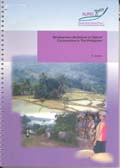| Working Paper Series |
 |
|
| Title | Environmental service Payments experiences, constrains and potential in the Philippines | | Author | Arocena-Fransico H | | Year | 2003 | | Project series (series title) | RUPES Working Paper No. 2003_4 | | Publisher | World Agroforestry Centre - ICRAF, SEA Regional Office and International Fund for Agricultural Development | | City of Publication | Bogor, Indonesia | | Number of Pages | 17 | | Call Number | WP0012-04 | | Keywords | Environmental Services, Payments, Waters, Philippines, Watersheds, Economics, Benefits Costs |
|
| Abstract: |
| About 70% of the country's total land area consists of watersheds. A watershed is a land area that catches and drains water into particular catchments downstream. The ability of the watersheds to regulate the quantity and quality of water depends on its land cover. Forests have traditionally been associated with watershed protection since trees can regulate the flow and cleanse water that drains to the catchments.
Knowing the importance of the forests for watershed protection, the challenge is to protect the remaining natural forest, encourage non-destructive/pro-environment land uses in secondary forests, and promote sustainable land uses/practices in deforested areas, including cultivated areas. Natural forests and tree-based land uses are important not only because of the critical role they play in providing adequate quantity and quality of water to consumers/users. Their role is also important in maintaining high biodiversity of flora and fauna and also in contributing to reduction of global warming. These environmental services are very important since they serve as the base of economic activities; they support ecological balance, and provide nature-based amenities that make living an enjoyable experience. These are in addition to the life support function that a forest-based ecosystem provides to all life forms, other than humans. It is also important to point out that fortunately, the provision of watershed protection, biodiversity maintenance, and carbon sequestration are joint products, with minimal tradeoff to be expected at some point in time (e.g. cutting down of trees to increase quantity of water may entail loss of biodiversity). These three-fold benefits are important considerations that must be weighed vis-à-vis the cost of maintaining the desired land uses. |
|
|
Download file(s): Click icon to download/open file.
|
| |
File Size |
Description |

|
145 KB |
Softcopy |
|
|
|
| Viewed in 2538 times. Downloaded in 1156 times. |